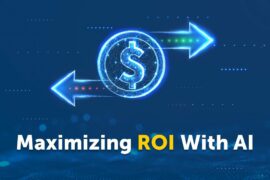Maximizing ROI with AI: Executive Strategies and Best Practices

The adoption of artificial intelligence (AI) into business operations is on the rise, driven by technological advancements and the need for a competitive edge. AI can automate processes, enable predictive analytics, enhance customer experiences through personalization, and optimize supply chains. AI is fundamentally reshaping the business landscape, from its current prominence in the tech sector to its anticipated future applications across diverse industries like healthcare.
By leveraging AI, companies can drive significant ROI and gain competitive advantage by automating tasks, reducing operational costs, and providing deep insights for informed decision-making. These capabilities lead to increased efficiency, customer loyalty, and market positioning, making AI a crucial asset for staying ahead of competitors and achieving substantial financial returns.
Understanding AI’s ROI potential
AI holds the potential to deliver significant ROI across various industries. It can contribute to key areas such as efficient content generation, anomaly detection, data management, process automation, and predictive analytics. From predictive maintenance in manufacturing to personalized recommendations in retail, AI demonstrably improves efficiency, profitability, and customer satisfaction across various industries.
AI-driven ROI includes improved CRM, faster content generation, identifying emerging fraud patterns, reduced customer attrition, and streamlined operations. By recognizing the multifaceted benefits, businesses can strategically integrate AI and unlock its transformative potential.
Assessing organizational AI readiness
AI adoption can yield significant benefits, but ensuring organizations are prepared is paramount. To assess organizational AI readiness, it is crucial to identify potential use cases where AI can add value and develop a comprehensive AI strategy aligned with core business goals. Organizations must pinpoint AI applications that drive significant ROI by analyzing processes and areas that require automation, complex decision-making, or personalized insights.
To develop a comprehensive AI strategy, it is necessary to clearly define objectives, build a cross-functional team, invest in scalable infrastructure, ensure ethical AI practices, and establish governance frameworks. AI initiatives must align with overall business goals to ensure that AI investments will contribute to innovation, efficiency, and growth.

Explore how Fusemachines helps businesses transform with its AI Products and AI Solutions.
Schedule a complimentary consultation with an AI expert.
Developing an AI strategy aligned with business goals
To leverage AI’s potential, businesses must develop a comprehensive strategy aligned with business goals. The following steps can be considered:
Selecting the right AI tools and technologies
Choosing the right AI tools and technologies is crucial for maximizing ROI and ensuring alignment with business goals. It involves evaluating scalability, ease of integration, support cost efficiency, and security. It is important to ensure that the AI tools can handle increasing data volumes and user demand, integrate seamlessly with existing systems, and provide comprehensive support.
Evaluating AI vendors and solutions for ROI potential
Evaluations of vendors and solutions can be performed by considering factors such as business alignment, technical capabilities, cost and ROI, experiences, and success stories. Tools like Gartner, Magic Quadrant, and Forrester Wave can assist in making comparisons. A thorough vendor evaluation ensures choosing a partner capable of delivering solutions that align with business strategic goals and provide substantial ROI.
Conducting pilot projects to validate their effectiveness
Conducting pilot projects is crucial for validating the effectiveness of AI solutions. Start by defining clear objectives and selecting representative use cases. Establish metrics to measure success and develop a detailed execution plan. Assess the pilot’s performance against metrics, gather stakeholder feedback, and conduct an ROI analysis to determine the financial viability of a full-scale implementation. This ensures the AI solution meets expectations and is scalable across the organization.
Measuring and optimizing AI ROI
To maximize ROI from AI initiatives, businesses must analyze financial and operational impacts and establish robust metrics. ROI can be measured by establishing key performance indicators (KPIs) that align with AI objectives, such as cost savings, revenue generation, time savings, customer satisfaction, and quality improvement. Executives must focus on actionable measures that provide clear insights and continuously monitor and optimize to ensure AI delivers long-term value.
Establish clear metrics
Begin by defining key performance indicators (KPIs) that align with AI objectives, covering areas such as cost savings, revenue generation, time savings, customer satisfaction, and quality improvement. These KPIs provide a comprehensive perspective on the impact of AI on business performance.
Monitor and track progress
Once the key metrics are established, KPIs require consistent monitoring to assess the ongoing impact of AI initiatives. Tracking progress by regularly collecting data helps in the identification of trends, potential roadblocks, and areas for improvement.
Optimize AI models and processes
Continuous optimization of AI models and processes leads to enhanced performance. Regularly retrain models with new data, reengineer business processes to align with AI capabilities, and establish feedback loops to refine AI applications.
Leverage advanced analytics and visualization tools
Utilize advanced analytics and visualization tools, such as dashboards and predictive analytics, to gain deeper insights and effectively communicate AI’s ROI. These tools help forecast future performance and evaluate the potential impact of different AI strategies.
Bottom Line
It has been a strategic imperative for modern companies to leverage AI to maintain a competitive advantage and achieve substantial financial returns. Fusemachine is at the forefront of this transformation, offering comprehensive AI solutions that empower organizations to automate processes, enhance decision-making, and drive significant ROI.

Explore how Fusemachines helps businesses transform with its AI Products and AI Solutions.
Schedule a complimentary consultation with an AI expert.


